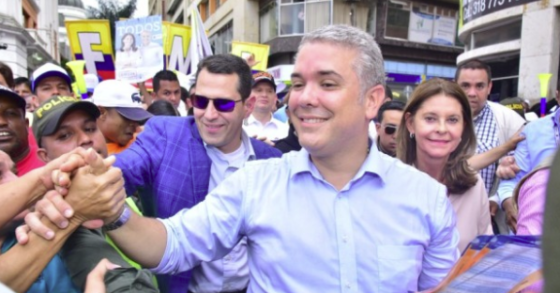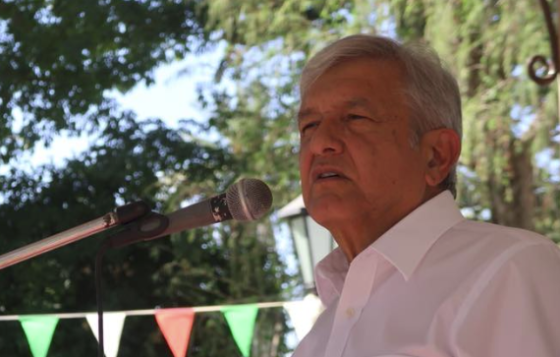
Will Colombia’s New President Deliver on His Promises?
Iván Duque, a conservative former senator, on Sunday won Colombia’s presidential runoff election. What does it mean for the country?
A Daily Publication of The Dialogue
As the Covid-19 pandemic spreads around the world, many Latin American and Caribbean countries continue to report new cases as governments take emergency actions in an effort to contain the virus. Among the measures, Peru and Panama have suspended classes in both private and public schools at least for a period of weeks, and countries including Argentina and El Salvador have restricted nonresidents from entering. How are Latin American and Caribbean nations coping with the spread of the new coronavirus? Which practices are working best, and where have gaps been identified? Are the region’s health care systems robust enough to effectively address the pandemic, and what steps should the region’s public and private health care providers be taking next?
María L. Ávila-Agüero, chief of the infectiology service at the National Children’s Hospital and former health minister of Costa Rica: “Since the beginning of the Covid-19 emergency, the WHO has said countries will be affected differently depending on the robustness of their public health policy and access to disease care services. Countries such as Costa Rica that have been capable of early identification of transmission chains will be able to modulate the speed of clinical cases’ presentation and community transmission—which is inevitable—which will allow health services not to be saturated and time to attend to serious cases. This virus will make many ill, but with low lethality. Strategies must be directed to ‘flattening the curve,’ which implies quarantines, the suspension of mass gatherings, emphasis on washing hands and sneeze and cough protocols; social distancing if there are respiratory symptoms; and protecting high-risk populations and older adults, with or without risk factors. Measures such as school closures are justified and based on a cost-benefit analysis. The closing of borders and restricting travel between regions has no epidemiological meaning, and its impact is minimal. Covid-19 is already in the Americas, but it cannot paralyze us. Adequate policies, taken in measure but without letting our guard down, will be essential to make it out well.”
Andrés Rozental, member of the Advisor board and president of Rozental & Asociados in Mexico City: “Together with other countries of Western Europe, North America and Asia, Latin American nations are under a daily growing severe threat of the Covid-19 pandemic. Equally, Latin American countries in general have waited too long to take the measures that are being undertaken to prevent or mitigate the effects of the crisis. Even though the absolute numbers published by the region’s governments are relatively low when compared to China, South Korea or Italy, there are serious doubts about how accurate those statistics are when there are so few individuals being tested. The same probably holds true for countries in Africa, Eastern Europe and the Indian subcontinent. If the health care infrastructures of wealthy developed economies are proving inadequate to deal with the pandemic, there will probably be even less ability for the poorer economies to attend to the thousands of individuals who will be infected in the coming weeks and months. Even though many Latin American authorities have temporarily suspended schools, canceled large public events and instructed citizens to take basic health measures such as washing hands, sanitizing surfaces and staying at home as much as possible, these probably won’t be enough to spare their populations from being infected and even dying. The presidents of Brazil and Mexico have been particularly poor examples of leadership in the current global crisis. Both have minimized the effects of the pandemic, continued to hold political rallies with hundreds of attendees packed in close proximity to one another, kiss babies and otherwise flaunt the basic rules of behavior in situations such as the one that their countries are going through. Not enough people are being tested, and the medical facilities available are clearly lacking. In the case of Mexico, President López Obrador’s dismantling of the Seguro Popular that covered the millions of Mexicans not in the government’s existing social security infrastructure has led to a chaotic situation with a resulting lack of medicines and uncertainty about how to get urgent care, all of which has complicated the country’s ability to face the coronavirus pandemic.”
Katherine Bliss, senior fellow at the CSIS Global Health Policy Center: “The number of confirmed cases of Covid-19 in the region continues to climb, with several countries reporting fatalities. To prevent importation of cases, Panama is prohibiting the entry of nonresident foreigners, while Honduras, Argentina and Peru have announced border closures. Costa Rica has shut down nightclubs, and Mexico’s soccer league has suspended its season. The Pan American Health Organization has prepared 29 laboratories to process diagnostic tests and deployed a tool to help hospitals analyze their readiness to receive an influx of patients. Several countries are members of the Global Health Security Agenda (GHSA), a partnership promoting health emergency preparedness since 2014, but few have conducted Joint External Evaluations to assess their capacity to respond to outbreaks in line with the World Health Organization’s International Health Regulations. The NTI/Johns Hopkins University 2019 Global Health Security Index (GHSI) lists several countries in the region among the top 40 globally for disease detection but gives fewer high marks for their capacity to treat the sick and protect health workers. Colombia, with thousands of Venezuelan migrants crossing into the country each day, may find it especially challenging to prevent Covid-19 transmission among the border-area population, while Venezuela, which ranks 176 out of 195 countries on the GHSI and faces a dearth of water and basic hygiene supplies in health care facilities, may be especially ill-prepared. The deportation of migrants from the United States and Mexico to Central America also raises concerns about increased risks of disease transmission in that region.”
Alejandro Chafuen, managing director, international, at the Acton Institute and president and founder of the Hispanic American Center for Economic Research: “Most Latin American leaders were waiting to see how the governments of the world’s most powerful economies would react to Covid-19. President Trump took the lead in restricting travel from China at the end of January. But it was not until the WHO declared it a pandemic and northern Italy was overwhelmed that Latin American policymakers began to react. Brazil and Mexico have reacted differently than the rest. In Mexico, the only difference I saw recently when arriving in Monterrey was signs telling those who had been in China and other infected countries to call a phone number if they felt sick. It is too early to see who has overreacted and who is underreacting. It is not a matter of left and right—both Bolsonaro and AMLO have been mingling with crowds, making little changes to their routines and horrifying most international observers. This despite the fact that two officials close to Bolsonaro have Covid-19. Is Latin America prepared? I doubt it, but results will vary. In most countries, people disrespect the law and are dissatisfied with their health care. Health spending in relation to GDP does not seem to matter. Brazil spends almost 12 percent of GDP on health care, and only 18 percent of its population regard the quality of the care they receive as good. Argentines spend 7.55 percent, and 58 percent regard the care as good. Mexicans spend even less, 5.47 percent, and 26 percent of the population regard the care as good. The hot weather has helped, but winter is coming.”
Adriano Massuda, professor at FGV-EAESP in São Paulo and visiting scientist at the Harvard School of Public Health: “Public health emergencies test the resilience of health systems, demanding rapid and effective responses from national and local governments. In Brazil, the Ministry of Health has been adopting appropriate measures to address the Covid-19 pandemic, with transparency on information and clear guidelines to the population. However, the national coordination may bump on the low capacity for local implementation. Fiscal austerity policies and recent modifications in well-established health policies aggravated the fragility of public services—from primary care to hospitals. In 2019, the Unified Health System (SUS) budget lost more than 9 billion reais ($2 billion), and the lack of doctors in primary care increased after the interruption of the More Doctors program. Besides, scarcity of intensive care units, supplies and qualified personnel to manage severe cases will likely further overburden the health system. Palliative measures were adopted. Congress has approved an extraordinary credit of 5 billion reais for actions against Covid-19. The federal government urgently opened up the hiring of 5,800 doctors to work on primary care services. However, it is still too little. If the population infection rate for Covid-19 is only 1 percent (excluding users of private health plans), and 5 percent of those require treatment in intensive care units, an additional 82,000 hospitalizations will be expected in the SUS, with an estimated cost of approximately 1 billion reais. Urgent strengthening of the SUS is the most appropriate measure to protect lives from Covid-19 threats in Brazil.”
 The Latin America Advisor features Q&A from leaders in politics, economics, and finance every business day. It is available to members of the Dialogue’s Corporate Program and others by subscription.
The Latin America Advisor features Q&A from leaders in politics, economics, and finance every business day. It is available to members of the Dialogue’s Corporate Program and others by subscription.
Iván Duque, a conservative former senator, on Sunday won Colombia’s presidential runoff election. What does it mean for the country?
Mexicans go to the polls on Sunday, July 1, for the country’s presidential, legislative and local elections. What can we expect?
Leftist Andrés Manuel López Obrador swept to victory Sunday in Mexico. What changes are in store?
 Photo: TV Perú.
Photo: TV Perú.

